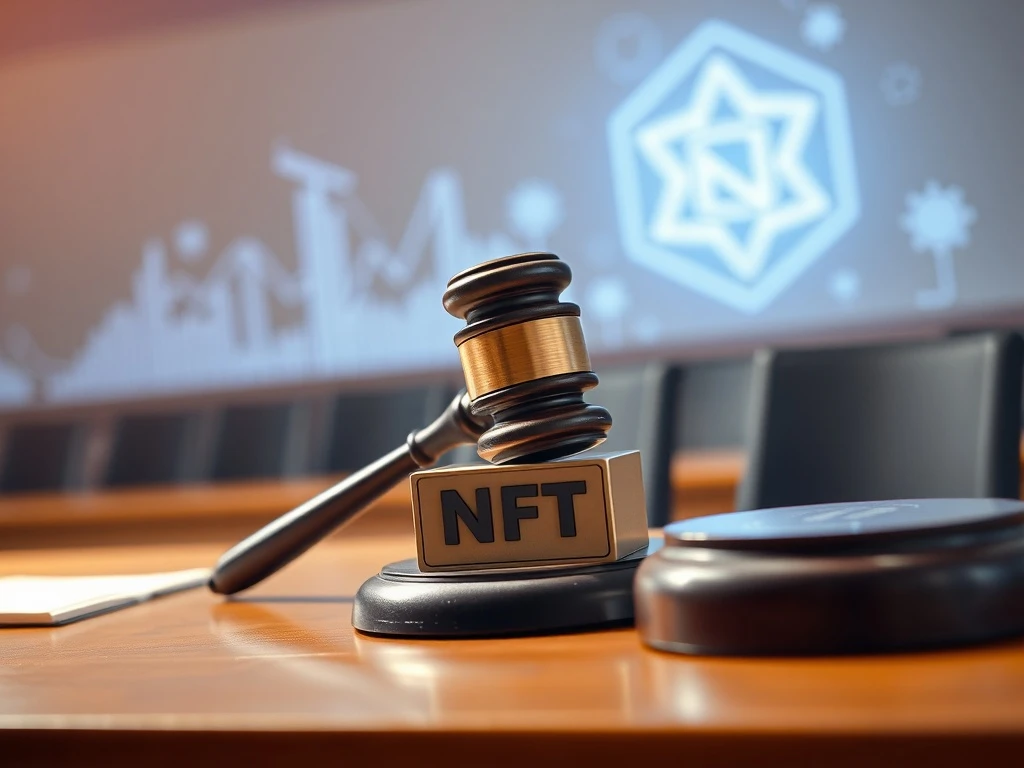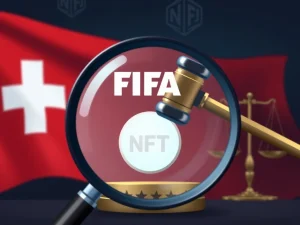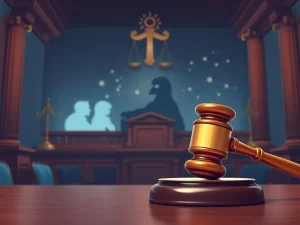Logan Paul CryptoZoo: Crucial Legal Boost in Class-Action Lawsuit

The legal battle surrounding Logan Paul CryptoZoo has captured significant attention within the cryptocurrency community. A recent judicial recommendation signals a crucial development. It concerns the proposed class-action lawsuit against the prominent YouTuber and his defunct NFT project, CryptoZoo. This decision offers a vital update for those tracking influencer-backed digital asset ventures.
Understanding the CryptoZoo Lawsuit
A Texas magistrate judge recently supported Logan Paul’s request. He sought to dismiss a proposed class-action lawsuit. This suit relates to his failed non-fungible token (NFT) project, CryptoZoo. Magistrate Judge Ronald Griffin issued this advice to an Austin federal court on Thursday. He stated that the class group had not sufficiently linked Paul to their claims. These claims alleged financial losses from CryptoZoo purchases.
This recommendation could lead to a federal judge dropping the entire suit. However, the class group retains the opportunity to amend their claims. The group comprises CryptoZoo buyers. They initially sued Paul and others associated with the project in February 2023. They alleged CryptoZoo was a “rug pull.” This term describes a deceptive scheme. Project developers abandon a crypto project. They run away with investors’ funds. The lawsuit claimed promised perks never materialized.
Judge Griffin did suggest one claim be permanently dismissed. This was an allegation of commodity pool fraud. Nevertheless, he allowed the class to amend 26 other claims against Paul. This provides a path forward for the plaintiffs, despite the initial setback.
Examining the Commodity Pool Fraud Claim in the CryptoZoo Lawsuit
Judge Griffin’s 75-page report detailed his reasoning. He recommended dismissing the lawsuit’s commodity pool fraud claim. The court, he stated, “does not follow Plaintiffs’ logic.” The class argued that CryptoZoo NFTs functioned as an option contract. They began as “eggs” that “hatch” into animals. These animals could then be bred. This process created hybrid animals. Such hybrids could be traded. An example included an elephant-shark hybrid NFT. This was presented as evidence.

“Purchasers buy CZ [CryptoZoo] NFTs unaware of their value until they hatch,” Judge Griffin wrote. “Because the CZ NFT animals can be bred with others to create hybrid NFTs, an option contract is thereby formed.” He found this argument unconvincing. “The mental gymnastics required to come to this conclusion are truly dizzying,” he added. The judge further explained, “Plaintiffs do not explain—nor can the Court understand—how their purchases of CZ NFTs create option contracts or contracts for future delivery.” This highlights the difficulty in classifying NFTs under existing commodity laws without clear precedent. This particular aspect of the CryptoZoo lawsuit proved challenging for the plaintiffs.
Challenges for Other Claims in the CryptoZoo Class Action
Judge Griffin observed that the lawsuit failed to adequately connect Paul to 26 other claims. These included allegations of fraud, unjust enrichment, negligence, and breach of contract. Further claims involved fraud conspiracy, aiding and abetting fraud, and breaches of consumer law. These spanned multiple states. The plaintiffs, according to the judge, had not yet shown evidence. This evidence would prove Paul directly and personally benefited from CryptoZoo’s collapse. This lack of direct linkage proved a significant obstacle for the plaintiffs in the ongoing CryptoZoo class action.
In some instances, the complaint offered “only fragments of facts.” These came “accompanied by vague attributions of conduct to ‘Defendants’.” Judge Griffin noted this deficiency. He also found attempts to “jam together two pieces of different puzzles.” This was done “in the vain hope of producing a final, cohesive product.” However, he firmly stated, “Unfortunately, the caselaw does not support this tactic.” This emphasizes the need for specific, actionable evidence in such complex legal proceedings, particularly when pursuing claims against high-profile individuals.
The Alleged NFT Rug Pull and Investor Impact
The term “NFT rug pull” gained notoriety during the crypto boom. It describes a malicious maneuver. Developers suddenly abandon a project. They take investors’ funds with them. This leaves investors with worthless assets. The CryptoZoo project, launched in 2021, quickly attracted attention. This was largely due to Logan Paul’s celebrity status. Buyers invested in NFTs. They were promised a play-to-earn game. This game would feature unique digital animals. However, the game never fully materialized. Investors felt defrauded. They believed their investments were effectively stolen. This led to widespread frustration among early adopters.
The plaintiffs in the lawsuit allege precisely this scenario. They claim the project was a fraudulent scheme. It was designed to enrich its creators at the expense of its buyers. Such allegations are serious. They carry significant implications for the burgeoning NFT market. They also highlight risks associated with celebrity endorsements in crypto. Investors often rely on such figures. They expect a level of due diligence and integrity. This case underscores the potential pitfalls when these expectations are not met. The very nature of an alleged NFT rug pull challenges the trust fundamental to new digital economies.
Logan Paul’s CryptoZoo Refund Initiative
The class group initially sued Paul and CryptoZoo co-founders Eduardo Ibanez and Jake Greenbaum in 2021. Paul himself alleged in January 2024 that these co-founders conned him. He claimed their actions caused CryptoZoo’s collapse. Judge Griffin urged the court in July to rebuff Paul’s counterclaims against them. This adds another layer of complexity to the ongoing legal saga.
In January 2023, Paul publicly pledged to devise a plan for CryptoZoo. A year later, he set aside $2.3 million for CryptoZoo refunds. This initiative came with a specific condition. Claimants had to agree not to sue over the project. Buyers received 0.1 Ether (ETH). This matched the original sale price of CryptoZoo NFTs in 2021. This refund effort aimed to mitigate some of the damage. It also sought to resolve disputes outside of court. However, some claimants still pursued legal action, leading to the current lawsuit.
The refund offer presented a dilemma for investors. They could accept a partial recovery. This meant waiving their right to sue. Alternatively, they could pursue legal action. This path offered the potential for greater compensation. However, it also carried significant legal costs and uncertainties. This situation underscores the complex choices faced by victims of alleged crypto scams, even with a formal CryptoZoo refund program in place.
Implications for CryptoZoo Class Action and Future Cases
This judicial recommendation carries significant weight. It impacts the ongoing CryptoZoo class action lawsuit. It also sets potential precedents for future cases. The ruling emphasizes the difficulty of applying traditional financial regulations to novel digital assets. Especially when they involve complex mechanics like “hatching” or “breeding” NFTs. Courts struggle to categorize these assets. They must fit them into existing legal frameworks. This case highlights that challenge.
Furthermore, the decision stresses the need for concrete evidence. Plaintiffs must directly link defendants to alleged harms. Vague attributions or circumstantial evidence may not suffice. This is particularly true in high-profile cases. Such cases often involve multiple parties and intricate financial flows. The outcome of this case could influence how future class-action lawsuits are structured. It might also affect how courts interpret influencer accountability in the Web3 space. The digital asset landscape evolves rapidly. Therefore, legal clarity remains paramount for investor protection and market integrity.
Ultimately, the CryptoZoo lawsuit continues to unfold. Its resolution will provide further insights. It will shape the legal landscape for NFTs and celebrity-backed projects. Investors and creators alike will watch closely. The outcome could define new boundaries for responsibility and redress in the decentralized world.









